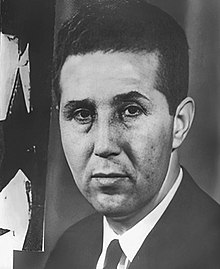Ahmed Ben Bella
| Ahmed Ben Bella | |
|---|---|
 |
|
| 1st President of Algeria | |
|
In office 15 September 1963 – 19 June 1965 |
|
| Preceded by | None |
| Succeeded by | Houari Boumediene (as Chairman of the Revolutionary Council) |
| Personal details | |
| Born |
25 December 1916 Maghnia, Algeria |
| Died | 11 April 2012 (aged 95) Algiers, Algeria |
| Political party | FLN |
| Spouse(s) | Zohra Michelle Sellami (m. ?–2008) |
| Children | Mehdia Ben Bella Noria Ben Bella |
| Religion | Sufi Islam |
Ahmed Ben Bella (Arabic: أحمد بن بلّة Aḥmad bin Billah; 25 December 1916 – 11 April 2012) was an Algerian socialist soldier and revolutionary who was the first President of Algeria from 1963 to 1965.
Ben Bella was born in Maghnia in western Algeria, during the height of the French colonial period on 25 December 1916. He attended school in Tlemcen and was disturbed by the discrimination towards Arabs by his European teacher. He failed his brevet exam, and subsequently dropped out of school.
Ben Bella volunteered for service in the French Army in 1936. The Army was one of the few avenues of advancement for Algerians under colonial rule and voluntary enlistment was common. Posted to Marseille he played center mid-field for Olympique de Marseille in 1939–1940. His only appearance for the club was in a game against FC Antibes in the Coupe de France on 29 April 1940 in Cannes. He also scored a goal during the game. The club officials offered him a professional spot on the team, but he rejected the offer. He also played for IRB Maghnia.
Ben Bella's eldest brother had also served in the French Army during World War I and died of his wounds. Two other brothers died at young ages. In 1940 Ben Bella enlisted again and was awarded the Croix de guerre. He was demobilised after the fall of France but joined a regiment of Moroccan tirailleurs (infantry) with whom he saw service throughout the Italian campaign. Ben Bella was promoted to the rank of warrant officer and received the Médaille militaire for bravery at Monte Cassino from Charles de Gaulle. He refused to accept an officer's commission after learning of the harsh French repression that followed a Muslim rising in the small Algerian town of Setif in May 1945.
...
Wikipedia
